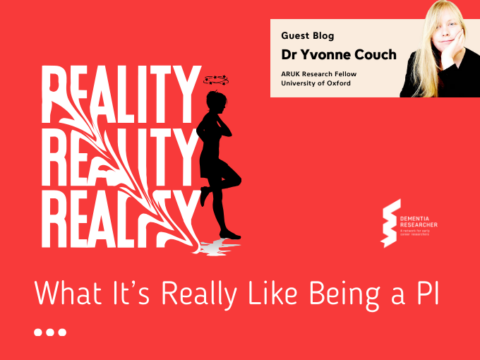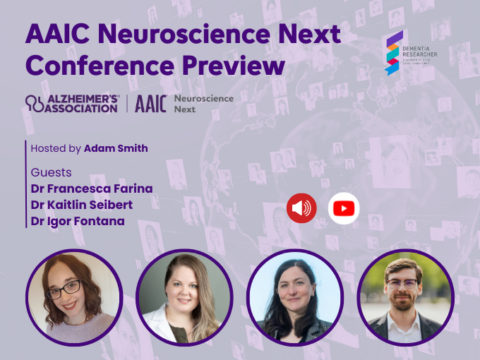Every now and again a little twitter storm blows-up, it probably isn’t big enough to be given a name yet, however its underlying cause is worth talking about… So in this blog I’m walking out into the storm to talk about Dementia Champions, their work, living well with dementia and the overall narrative and how dementia is perceived as a result (and if you enjoy this blog, you may also like this one from Nathan Stephens).
Over the years I have had the privilege of working with some truly inspirational people who have been diagnosed with different forms of dementia. I am not a clinical researcher, which means the fact that I even knew these people is mostly because after they received the terrible news… they waved, shouted, jumped up and down, reached out, turned to social media, and decided that they would not ‘go silently into the night’. Many of these people have become champions, presenters, and charity ambassadors. They have written books and become shining examples for everyone who wants to highlight how it is possible to ‘live well with dementia’. However, these people are not typical of the 100,000 people who receive a diagnosis in England every year, they are extraordinary people, who use the time they have, to show just what is possible… campaigners, charities and others argue that through there example others are inspired to live and learn and improve their lives with a diagnosis.
Then… there are others who argue… that some (not all) of these champions do not realistically represent life with dementia. They argue that some of the individuals wearing the champion badges, may have been misdiagnosed (not based on personal knowledge of the individuals, but instead based on how that person presents, and on the time elapsed since diagnosis – and let’s face it, we know that young-onset dementia can be difficult to diagnose). As a result, they ask if their experiences are valid? Are they misrepresenting life with the condition? Then, there is the second issue, that the people who tell their story are extraordinary people, and that there needs to be more media focus on the lives of the other 99% of people who are diagnosed very late, they don’t have support, their symptoms rapidly progress… and sadly, the final year or more of their lives are very unpleasant. They argue that this is a realistic picture, and one that would be more honest.

Do you have first-hand experience of dementia? Help shape Alzheimer’s Society work through their Dementia Voice Programme, and use your experience to ensure everything they do reflects the needs of people affected by dementia.
As a blogger, I find myself having an opinion… and truthfully, I think both sides of this debate are right! To help articulate my points, I’ve broken it down:
- I think anyone with a diagnosis should be supported and encouraged to come forward and talk about their experiences. We know that it helps others and can inspire. However, when dealing with the press and the public, I think it is important that everyone shares how dementia effects people differently. There will always be something that people can take away from the champions, but it doesn’t mean that you must aspire to be them, or that you’re failing to ‘live your best life’ if you don’t talk about your experiences or run a marathon or write a book. Everyone copes differently, and whatever way you find to survive and live is fine!
- We shouldn’t criticise individuals who become champions, even if their experiences are not typical. Instead, we should work to get better at sharing the stories and lives of the 99% so that the overall picture we paint of life with dementia is one that is honest, for everyone in every situation. By pairing the people who have become champions with the people who aren’t we have a chance to create balance. Because whilst we may prefer to talk about the amazing people living with dementia who become champions, we should also talk about the thousands upon thousands of people who do not get support and who are not ‘living well with dementia’. People who self-define as suffering with the disease, even in an age when the word suffer is taboo (that isn’t to say that champions don’t paint a realistic picture of life with dementia, but it is their life – they don’t all argue that they live well, but they survive and that is also an important message).
- Misdiagnosis… this is tricky, it happens, it happens a lot! I have known champions who lost their lives to the disease, and I also know champions who are still here 10 years on and who, on the face of it, do not seem to have significantly deteriorated. We know that dementia effects everyone differently and at different speeds, but we also know that our ability to accurately diagnose young-onset dementia 10 years ago (or even now), was probably lacking (although getting better). I don’t think we should question the motives of champions, but instead support an honest dialogue. Because a discussion about diagnosis, its impact and aftercare is important too – some people deteriorate slowly (particularly champions who are doing all the things to delay onset e.g., keeping active, changes to diet, exercise etc. which is particularly relevant in diseases like Vascular Dementia – you can’t recover what you have lost, but you can influence keeping what you have), and others will have been misdiagnosed, quite how you talk about this, when you spent years starting your talks with “Hello my name is xxx, and I have dementia” must be hard!
To round-up I think it is important that we show what a good and bad life with dementia is like, and what a life in-between looks like – and support and celebrate those who share their experiences. Because, people need to know the truth, but they also need hope, and support and inspiration to show that it can be better.
I don’t have dementia, and there are lots more people better qualified to discuss this topic, but I have met lots of people living with the disease, and their carers and loves once who have taken their time to share their experiences with me – and I want to thank them for taking the time, you make all researchers work possible through the generous giving of your time.
Note: The author of this blog uses the term ‘Dementia Champion’ to describe a person with lived experience of dementia, who shares their experience – in Scotland a ‘Dementia Champion’ is a health and social care professional that has completed an intensive eight-month programme, to see, hear and feel the experiences of people living with dementia through working closely with them, their carers and their families. It enables the professionals to take the practical knowledge they have learned and share it to make a real difference in their everyday work, whether that is in hospital wards or in community care settings. In Scotland the current term for people with dementia participating in research and education is active voices.
Author
Adam Smith was born in the north, a long time ago. He wanted to write books, but ended up working in the NHS, and at the Department of Health. He is now Programme Director at University College London (which probably sounds more important than it is – his words). He has led a number of initiatives to improve dementia research (including this website, Join Dementia Research & ENRICH), as well as pursuing his own research interests. In his spare time, he grows vegetables, builds Lego, likes rockets & spends most of his time drinking too much coffee and squeezing technology into his house.

 Print This Post
Print This Post





I don’t see myself as a Dementia Champion, I do think there is too much publicity around certain people with dementia. I just get on and do what I can for selfish reasons; “Catnip to the brain”. Yes, I am helping others but I am also helping myself. No longer on Twitter, partly because the publicity given to some made me feel inconsequential. Didn’t do my mental health any good!